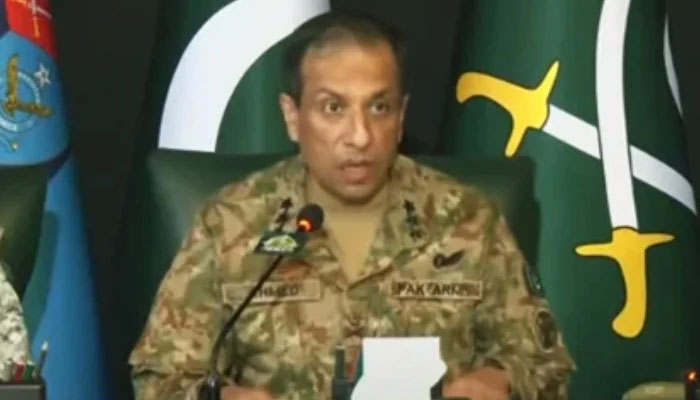Road to resolution
Without justice for Kashmir, there can be no lasting peace in South Asia
In a region where the spectre of nuclear confrontation looms large, the ceasefire announcement between India and Pakistan – followed by a direct conversation between their Directors General of Military Operations (DGMOs) – is a welcome retreat from disaster. In a world already rattled by wars and economic instability, a full-scale conflict between nuclear-armed neighbours is a risk no one can afford to ignore. It is encouraging to see both nations reaffirming their commitment to peace, a stance reinforced by the Pakistan military leadership during Sunday’s press briefing by ISPR DG Lt-Gen Ahmed Sharif Chaudhry, Vice Admiral Raja Rab Nawaz and Air Vice Marshal Aurangzeb Ahmed. The message was unequivocal: war must never be an option, Lt-Gen Chaudhry’s words a sobering reality check: conflict between two nuclear-armed rivals is an absurdity and any attempt to create space for war between India and Pakistan is nothing short of creating space for mutual annihilation. These aren’t rhetorical flourishes; they reflect the terrifying truth that more than 1.6 billion lives are at risk when nationalism, political calculation or military bravado overrides reason. Sunday’s press conference also offered a display of Pakistan’s military professionalism. Even in the aftermath of what was clearly a successful and strategic defence operation, the armed forces chose dignity over triumphalism, with Air Vice Marshal Aurangzeb respectfully acknowledging his Indian counterparts and their aircraft.
The role of Pakistani media and social media during this period has also drawn praise, with Prime Minister Shehbaz Sharif and the ISPR presser acknowledging them. In stark contrast to the often sensationalist and factually challenged reporting across Indian media, Pakistan’s media upheld a message of credibility while Pakistani social media -- especially on X (Twitter) -- showed that digital patriotism, humour and cohesion can be powerful tools of national resilience. The lifting of the X ban is a welcome development, and it must not be reversed. Free expression, even when critical, only strengthens a nation. One hopes those at the top realise that. Meanwhile, Pakistan’s Ministry of Foreign Affairs (MoFA) has delivered a firm yet responsible statement, emphasising that despite blatant provocations by India, Pakistan acted with restraint, and does not seek war but will defend its people. The silence of much of the international community in the face of repeated Indian belligerence, however, remains deeply concerning. At the root of the current volatility lies the unresolved Kashmir dispute. The foreign ministry has rightly urged the world to look beyond bilateral rivalries and examine the wider geopolitical dynamics that continue to destabilise the region. The re-emergence of Kashmir on the international agenda, through Trump’s recent remarks, is also a significant development. The fact is simple: the Kashmir issue cannot be buried or ignored. The people of Indian Occupied Kashmir deserve their fundamental rights.
All said, peace cannot be one-sided. Pakistan has consistently chosen the path of diplomacy and de-escalation, but if India continues to pursue military adventurism, it risks pulling the entire region into chaos. The global community must not merely urge calm – it must act. It must press for a just resolution to the Kashmir conflict and ensure that South Asia is not left to the whims of warmongering politics. Kashmir is not just a territorial issue. It is a humanitarian crisis and a geopolitical fault line. The world must recognise this truth before it is too late. Without justice for Kashmir, there can be no lasting peace in South Asia. And without peace in South Asia, global stability remains forever in jeopardy.
-
 ChatGPT Caricature Prompts Are Going Viral. Here’s List You Must Try
ChatGPT Caricature Prompts Are Going Viral. Here’s List You Must Try -
 James Pearce Jr. Arrested In Florida After Alleged Domestic Dispute, Falcons Respond
James Pearce Jr. Arrested In Florida After Alleged Domestic Dispute, Falcons Respond -
 Cavaliers Vs Kings: James Harden Shines Late In Cleveland Debut Win
Cavaliers Vs Kings: James Harden Shines Late In Cleveland Debut Win -
 2026 Winter Olympics Snowboarding: Su Yiming Wins Bronze And Completes Medal Set
2026 Winter Olympics Snowboarding: Su Yiming Wins Bronze And Completes Medal Set -
 Trump Hosts Honduran President Nasry Asfura At Mar-a-Lago To Discuss Trade, Security
Trump Hosts Honduran President Nasry Asfura At Mar-a-Lago To Discuss Trade, Security -
 Cuba-Canada Travel Advisory Raises Concerns As Visitor Numbers Decline
Cuba-Canada Travel Advisory Raises Concerns As Visitor Numbers Decline -
 Anthropic Buys 'Super Bowl' Ads To Slam OpenAI’s ChatGPT Ad Strategy
Anthropic Buys 'Super Bowl' Ads To Slam OpenAI’s ChatGPT Ad Strategy -
 Prevent Cancer With These Simple Lifestyle Changes
Prevent Cancer With These Simple Lifestyle Changes -
 Air Canada Flight Diverted St John's With 368 Passengers After Onboard Incident
Air Canada Flight Diverted St John's With 368 Passengers After Onboard Incident -
 Experts Reveal Keto Diet As Key To Treating Depression
Experts Reveal Keto Diet As Key To Treating Depression -
 Inter Miami Vs Barcelona SC Recap As Messi Shines With Goal And Assist
Inter Miami Vs Barcelona SC Recap As Messi Shines With Goal And Assist -
 David Beckham Pays Tribute To Estranged Son Brooklyn Amid Ongoing Family Rift
David Beckham Pays Tribute To Estranged Son Brooklyn Amid Ongoing Family Rift -
 Jailton Almeida Speaks Out After UFC Controversy And Short Notice Fight Booking
Jailton Almeida Speaks Out After UFC Controversy And Short Notice Fight Booking -
 Extreme Cold Warning Issued As Blizzard Hits Southern Ontario Including Toronto
Extreme Cold Warning Issued As Blizzard Hits Southern Ontario Including Toronto -
 Lana Del Rey Announces New Single Co-written With Husband Jeremy Dufrene
Lana Del Rey Announces New Single Co-written With Husband Jeremy Dufrene -
 Ukraine-Russia Talks Heat Up As Zelenskyy Warns Of US Pressure Before Elections
Ukraine-Russia Talks Heat Up As Zelenskyy Warns Of US Pressure Before Elections




